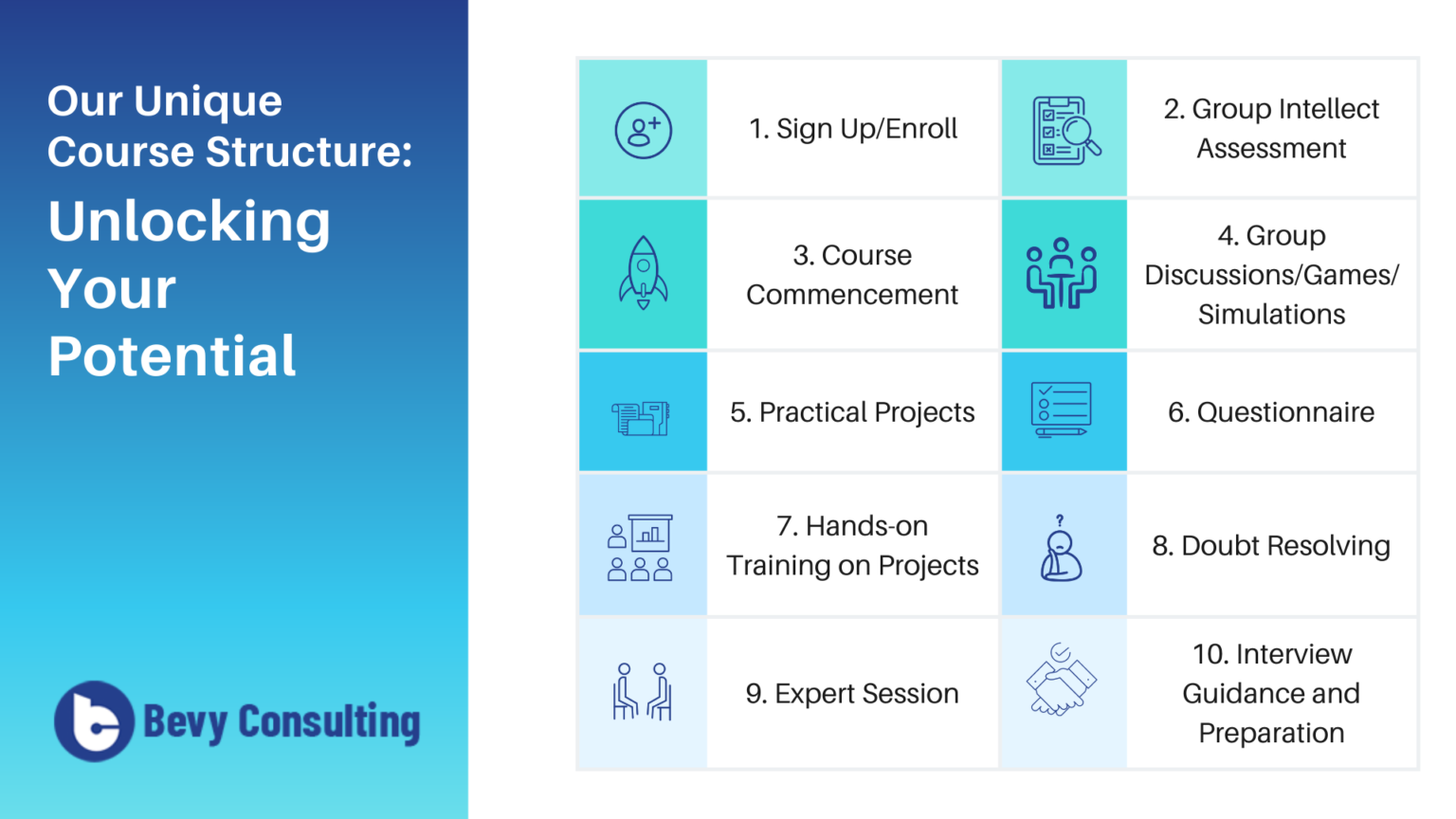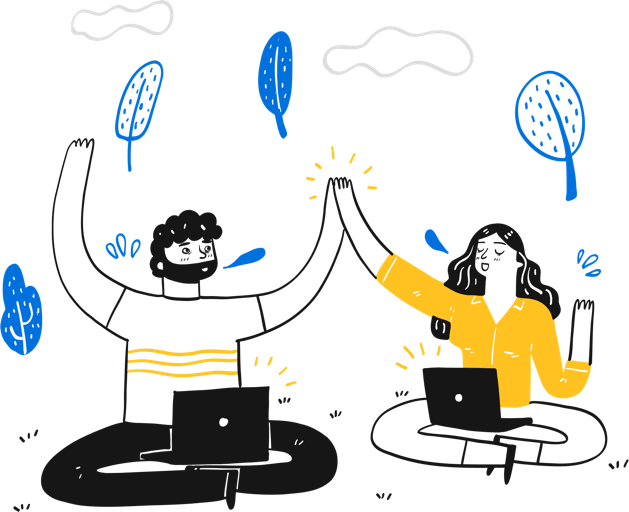Full Stack Developer Training
September 11, 2022 2023-09-01 8:23Full Stack Developer Training
Online Full Stack Developer Training
Get a complete suite of software development skills with Bevy Consulting’s best-in-class online Full Stack Developer training. Learn cutting-edge tools like Java, SQL, and more, and be job-ready in no time.
2000+
Learners
3 Months
15hrs/week
Course Overview
Our Full Stack Developer Training program is designed for students in the USA, Canada, and the UK who want to become proficient in developing end-to-end web applications. This comprehensive course covers both front-end and back-end development, including HTML, CSS, JavaScript, Node.js, React, and MongoDB. You’ll also learn how to use Git, GitHub, and agile development methodologies to collaborate on projects and manage version control. Our experienced instructors will guide you through hands-on labs and real-world scenarios to help you gain practical experience in developing and deploying web applications. By the end of this course, you’ll have the skills and knowledge to design, develop, and deploy web applications that meet modern web standards. Join our Full Stack Developer Training program and start your journey towards becoming a skilled and sought-after developer in the rapidly growing tech industry.
9 out of 10 freshers and professionals have realized the potential of industry-standard Full Stack Developer Training for a successful career.
Our unique, hands-on approach includes 500+ hours of learning, providing practical training, case studies, and discussions for ‘real-world’ experience.
Candidates get excellent placement opportunities at top MNC companies like Honeywell, Microsoft, IBM, TCS, and Capgemini on successful course completion.
About the Course
Excel in software development fundamentals, Java and data structures,
Agile and Scrum methodologies, GIT to manage version control systems,
and Maven to manage project dependencies
- Career essential topics covered
- 60+ case studies and projects
- Daily doubt resolution support
- 1:1 career mentorship sessions
Program Overview
- 70 Hours of Blended Learning
- Hands-on Training on Popular DevOps Tools
- Live Projects
- Essential Interview Training
- Resume Assistance
- On-Job support and assistance
Syllabus
Learn from a meticulously curated syllabus that includes the industry’s best practices taught in the form of practicals, case studies, and discussions.
Program Overview
Syllabus
- Introduction to Java Programming and OOPS Concepts
- Learn Java Tokens, Identifiers, Comments, Keywords
- Hands-on with Java Editing tools like Eclipse, Editplus, NetBeans
- Working with Packages
- Understand Access Modifiers
- What are Datatypes and Variables
- Work with Type Conversion, Promotion and Casting
- Work with reading runtime values from keyboard inputs
- Understanding Variable and Variables Types
- Master Methods and method types
- Work with Operators
- Learning Control Statements
- Build Constructor and constructor types
- Understanding Compiler and JVM Architecture using Reflection API
- Work with static members and execution control flows
- Understanding non-static member execution control flows
- How to use : This keyword, final keyword, super keyword
- Working with Classes and class types
- Learn OOPS Fundamentals
- Work with Models, Relations and their Principles
- Develop using Coupling and Cohesion with MVC, LCRP Architectures
- Understanding of object types and Garbage Collection
- Working with Arrays
- Developing using Enum and Annotation
- Working with Design Patterns
- Building using Fundamental Classes like Runtime, Object, System, Class
- Learn String Handling
- Master Exception Handling
- Using Assertions effectively
- Work with Multithreading with JVM Architecture
- Develop IO Streams with File IO
- Understanding Wrapper Classes with Auto boxing and unboxing
- Use Collections
- Working with Generics
- Understanding Java 5, 6, 7, 8 and 11 new features
- Working with Inner classes
- Using Regular Expressions effectively
- Using Formatting date, time using java.text package
- Introduction to JDBC
- JDBC architecture
- java.sql Package
- Four Levels of JDBC drivers
- Connection, Statement, ResultSet
- Prepared Statement
- Callable Statement
- Batch Processing
- ResultSetMetaData
- Transaction Management
- Features of JDBC 3.0
- Introduction to Servlets
- Web application Architecture
- Web Server & Containers
- Http Protocol
- Web application developement
- Understanding Servlet api
- Html-Servlet Communication
- Servlet Life Cycle
- Deployment of webapplication in different severs
- Servlet to DB s/w communcation
- Servlet to Servlet Communcation
- SessionTracking
- Servlet Filters & wrappers
- Annotations based servlet programming
- Web-Security
- Understanding disadvantages of Servlets
- Introduction to JSP
- JSP Life Cycle
- Creating dynamic Web content with JSP
- Scripting elements
- Declaration
- Expression
- XML syntax for JSP elements
- JSP directives page, include and taglib
- JSP implicit objects
- JSP scopes
- Include and forward mechanism
- Using a Java bean in a jsp
- JSP Model 1 architecture
- JSP Model 2 (MVC) architecture
- Custom Tag Development
- Classic Tags, Simple Tags
- Error Handling in a jsp
- JSTL
- Expression Language
- Working effectively with Eclipse
- Oracle
- MySQL
- Tomcat
- Basics of Hibernate
- Hibernate Introduction
- Hibernate Architecture
- Understanding First Hibernate application
- Hibernate with IDE
- Hibernate in Eclipse
- Hibernate Application
- Hibernate with annotation
- Hibernate Web application
- Hibernate Generator classes
- Hibernate Dialects
- Inheritance Mapping
- Collection Mapping
- Transaction Management
- HQL (Hibernate Query Language)
- HCQL (Hibernate Criteria)
- Named Query
- Hibernate Caching
- Integration Hibernate and Spring
- What is Spring?
- Overview of the Spring Framework
- Spring Philosophies
- Spring Documentation
- Spring Containers
- Spring Configuration File
- Spring Beans
- Using the Container
- The Bean Factory Interface
- Singleton vs. Prototype
- Bean Naming
- Dependency Injection
- Setter Injection
- Constructor Injection
- The ApplicationContext Interface
- Accessing Application Components
- Accessing Resources
- Internationalization with MessageSource
- Application Events
- The Validator Interface
- The Errors Interface
- The ValidationUtils Class
- Validator Example
- Testing the Validator
- Property Editors
- Custom Property Editors
- Aspect-Oriented Programming
- AOP Concepts
- AOP Proxies
- The AOP Alliance
- Types of Advice
- AOP Example
- Introductions
- A Simpler Approach
- The JdbcTemplate Class
- Exception Translation
- Updating with the JdbcTemplate
- Queries using the JdbcTemplate
- Mapping Results to Java Objects
- What is Hibernate?
- Hibernate Sessions
- The HibernateTemplate
- Sample Class and Mapping File
- Creating and Saving a New Entity
- Locating an Existing Entity
- Updating an Existing Entity
- Hibernate Query Language
- Executing Queries
- Introduction
- SOA Architecture Principles
- Types of web services
- Java RESTful Web Services API
- Restful Web Services Annotations
- REST API Implementations
- Java Restful Web Services Tutorial
- Jersey Restful Web Services
- REST Example Model Classes
- Restful Web Services Test
- RESTEasy RESTful Web Services Example
- RESTEasy Web Services Test
- Maven
- Junit
- Log 4J
- SVN
- Git hub
- Jira
- Angular JS – Introduction
- Angular JS – Directives
- Angular JS – Data Binding
- Angular JS – Filters
- Angular JS – HTML DOM
- Angular JS – Events
- Angular JS – Modules
- Angular JS – Single
- Page Applications
- Angular Service Types
- Angular 2
- React JS

What Our
Learners Say
People love Bevy, so do you. Because this is the All-in-one solution for any Online studying, eLearning center.
Oliver Beddows
/ Designer, HydrabadMadley Pondor
/ Team Lead, BengluruMina Hollace
/ QA, PuneLuvic Dubble
/ Designer, DelhiFrequently Asked Questions









